Written by: Swapnil Mukherjee
Introduction
India, a nation renowned for its rich tapestry of culture and deeply ingrained traditions, possesses an intricate history steeped in the essence of family-centric societies. Nevertheless, this very diversity occasionally precipitates conflicts and contentions within the familial realm. Family disputes in India often orbit around concerns encompassing property division, inheritance, conjugal discord, custodial wrangles, and more. Traditionally, the resolution of these disputes bore witness to protracted, adversarial court procedures. These not only strained interfamily relationships but also inflicted substantial strain upon the judicial machinery. In response to this pressing issue, Alternative Dispute Resolution (ADR) mechanisms have ascended as efficacious instruments for the redressal of family disputes within the Indian context. The following discourse embarks upon an exploration of the pivotal role played by ADR in the context of ameliorating family disputes in India.
Comprehending Family Disputes in India
Family disputes in India are imbued with intricacies, owing to the diverse legal and cultural milieu of the nation. Some of the most prevalent categories of family disputes in India encompass:
Property and Inheritance Disputes: With the prevalence of joint familial structures in numerous Indian regions, disputes regarding property and inheritance rights frequently materialize, instigating legal wrangles that endure for years.
Marital Discord: India has borne witness to a surge in conjugal conflicts and divorces in recent times. Factors such as dowry-related issues, domestic violence, and disparities in lifestyle and values contribute to the proliferation of marital disputes.
Child Custody and Maintenance: Battles over custody and disagreements concerning child support payments often inflict emotional tribulations upon both parents and their progeny.
Elderly Abuse: Instances of maltreatment or neglect of elderly family members are not infrequent in India, necessitating the intercession of legal recourse.
Succession Planning: In numerous families, discord over the inheritance of family businesses or assets can germinate into disputes that imperil the fiscal stability of the familial unit.
Conventional Adjudication vs. Alternative Dispute Resolution
Traditionally, the resolution of family disputes in India was orchestrated through the conduit of the orthodox court system. Nonetheless, this modus operandi was fraught with sundry drawbacks, encompassing:
Protracted Legal Protraction: The courts of India are frequently inundated with caseloads, resulting in inordinate delays in the resolution of disputes. Family affairs oftentimes meander through the labyrinthine corridors of justice for years, exacting a severe toll, both emotionally and financially.
Adversarial Tenor: The nature of court proceedings typically assumes an adversarial posture, pitting family members against one another. This adversarial climate serves to exacerbate extant conflicts, thereby exacerbating familial rifts.
Privacy Deficit: Court hearings are quintessentially public spectacles, thereby subjecting familial tribulations to the discerning gaze of society at large and the consequent potential for social stigma.
Pecuniary Onus: Legal proceedings entail a not inconsequential financial burden, occasioned by way of substantial legal fees and ancillary expenses.
To ameliorate these predicaments, ADR mechanisms have manifested as viable alternatives to the adjudication of family disputes in India.
The Role of Alternative Dispute Resolution (ADR)
ADR encapsulates an array of techniques and processes devised to arbitrate disputes outside the precincts of the customary courtroom setting. These mechanisms have garnered prominence due to their capacity for expeditious, cost-efficient, and less acrimonious conflict resolution. In the context of family disputes in India, ADR serves a pivotal role in the ensuing capacities:
Mediation: Mediation stands out as a widely espoused ADR technique, wherein a neutral third party, denominated the mediator, orchestrates a dialogue between the parties embroiled in the dispute, with the objective of facilitating the emergence of a mutually acceptable resolution. In the domain of familial disputes, mediators often ply their expertise to preserve interfamily bonds and ensure that the welfare of children and vulnerable family members finds due consideration. Mediation serves as a vehicle through which families can negotiate common ground and cultivate bespoke solutions tailored to their unique circumstances.
Arbitration: In scenarios wherein families are disposed to a legally binding resolution but seek to eschew courtroom litigation, arbitration presents itself as a viable option. In the realm of arbitration, a neutral arbitrator presides over the contentions proffered by both parties and subsequently dispenses a binding adjudication. This avenue affords a swifter and more adaptable recourse in comparison to conventional courtroom procedures.
Conciliation: Conciliation, akin to mediation, posits a neutral third party as a facilitator, albeit with a heightened proclivity toward proffering potential solutions. This modality finds its utility in disputes marked by impaired interparty communication or an appreciable imbalance of power.
Family Court-Annexed ADR: In certain Indian states, initiatives have been promulgated to incorporate ADR programs within the precincts of the family court system. These programs proffer families embroiled in disputes the opportunity to engage in mediation, negotiation, or conciliation under the tutelage of trained professionals.
Counseling and Therapy: In instances typified by marital discord or familial frictions catalyzed by mental health issues, counseling and therapeutic interventions emerge as imperative components of the ADR toolkit. These services endeavor to address the underlying emotional and psychological substrata of the dispute, thereby facilitating the healing and reconstruction of familial relationships.
Benefits of ADR in the Resolution of Family Disputes
The embracement of ADR as a mechanism for resolving family disputes in India confers manifold advantages, inclusive of:
Expedited Redressal: ADR processes, by and large, manifest as more expeditious alternatives vis-a-vis conventional courtroom proceedings, thereby endowing families with the capacity to expeditiously surmount their tribulations.
Cost-Efficiency: ADR typically proffers cost efficiency by dint of attenuating legal fees and associated pecuniary outlays.
Preservation of Relationships: ADR techniques, epitomized by mediation, are predicated on the preservation of relationships as opposed to the exacerbation of conflicts—a facet of paramount significance in the context of familial disputes.
Confidentiality: ADR proceedings are characterized by their confidentiality, thereby ensuring that confidential familial concerns remain within the precincts of privacy.
Tailor-Made Solutions: ADR accommodates the generation of supple, customized solutions that duly take into account the idiosyncratic exigencies and concerns of the implicated familial constituents.
Mitigation of Emotional Stress: ADR processes typically eschew the acrimony and confrontational ethos that can pervade traditional litigation, thereby curbing the emotional duress borne by the involved parties.
Challenges and Constraints of ADR in India
While ADR has burgeoned as an efficacious means of redressal in numerous family dispute cases within India, it is not bereft of challenges and limitations, including:
Awareness Deficiency: A notable proportion of individuals remain unacquainted with the array of ADR alternatives or possess only a rudimentary comprehension of their mechanics, which prompts them to opt for traditional litigation.
Enforceability Concerns: Though awards emanating from arbitration bear the imprimatur of legal enforceability, other outcomes engendered by ADR may not be imbued with similar binding potency, thereby instigating disputes regarding compliance.
Cultural and Societal Factors: Traditional values and societal norms often wield a pronounced influence upon the willingness of individuals to partake in ADR, especially in rural hinterlands wherein community and familial reputation assume heightened significance.
Capacity and Training: India stands in need of a greater cadre of proficient ADR practitioners, particularly in rural and remote areas, in order to adequately satiate the burgeoning demand for these services.
Complex Cases: ADR may prove unsuitable for disputes characterized by intricate legal or financial intricacies, which may necessitate the expertise of the conventional judicial system.
Conclusion
The burgeoning role assumed by Alternative Dispute Resolution in the redressal of family disputes within India is of escalating import. It affords an expedient, cost-effective, and relationship-centered modus operandi for resolving conflicts when juxtaposed against traditional litigation. As India continues its trajectory of evolution, ADR mechanisms must occupy a more conspicuous position in the schema addressing family disputes. Concerted endeavors should be directed toward augmenting awareness levels and enhancing accessibility to these services, notably in remote hinterlands. Through the assiduous embrace of ADR, India can alleviate the burden upon its overtaxed judicial apparatus and promulgate harmonious resolutions that accord primacy to the well-being of families and individuals.









No comments:
Post a Comment